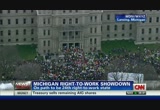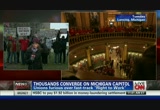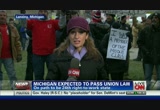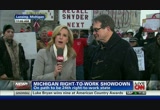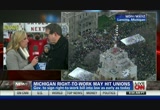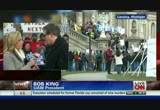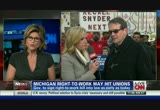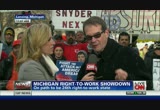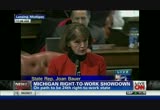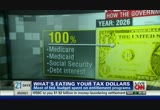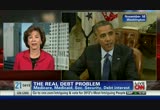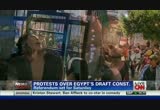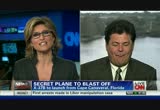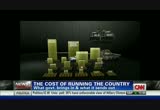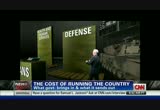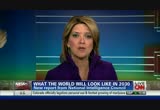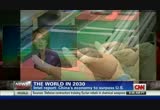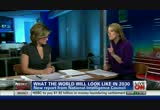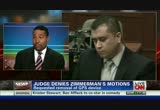tv CNN Newsroom CNN December 11, 2012 8:00am-9:00am PST
8:00 am
surreptitious self-portrait. so we may never know if the smile was as nat king cole sang to tempt a lover or simply to confound humanity. ben wedeman, cnn, florence, italy. >> i'm ted rowlands, thanks for joining us today. "cnn newsroom" continues right now with ashleigh banfield. thank you so much, ted. hi, everybody. it's nice to have you with us. 11:00 on the east coast, 8:00 a.m. on the west coast. let's begin here, a threat to the strength of the union. it's playing out moment by moment in michigan today. one of the most heavily unionized states in america. that state is on the verge of passing something called a right to work law that would make it illegal to force anyone to join a union or pay union dues if they want to take the job. you've got live pictures here in front of you from the state capitol in michigan. that's lansing. thousands of protesters, none too happy with those challenging this law. more than 600,000 michigan
8:01 am
workers are part of a union. they belong. and if you do the math with the population, that works out to nearly 18% of the state's workforce. much higher than the national percentage as well. our alison kosik has been story all morning long and the noise level as well as the number of people seems to be growing. >> reporter: that's right. you know, as the day has progressed, you know, there's well over, i would say, 2,000 people out here. that is short, though, of the 1,000 that was expected. inside the capitol, though, there's a lot going on. for one, the vote. the first vote of two expected to happen in the next ten minutes. at least the process expected to happen. and if you look at what's going on inside, 400 to 500 protesters are inside, some watching the action on the house floor. others standing around the rotunda, chanting, pounding their fists against this right to work bill. once again, outside, as you can see, they're holding signs, asking rick schneider, the
8:02 am
governor of michigan, to be recalled. ashleigh? >> and what's the look in terms of timing on all of this? the vote and then what the governor has said he will do, which is sign it as soon as he gets it. >> reporter: exactly. so what is going to happen today is once the process begins in the house, of voting, there are going to be two bills that are voted on. one, a vote on public unions. the second vote on private unions. both of those bills are expected to pass the house. if they do, the measure will go to governor rick schneider's desk. he is expected to sign it as early as today, if all of this transpires as expected. ashleigh? >> and we've got live pictures before you, alison, of the house vote that's going on right now as we speak. so what's the reaction? it looks as if this is going to be a fate kplooe in many people's eyes.
8:03 am
what are the unions going to do about it, if anything? >> reporter: i basically asked them, this is pretty much a lost cause, isn't it? and they said, no, it's not, because we want our voices heard, and even though we're not going to keep this law from going into effect, they say they will have the power come election time in two years to change the landscape. so they want their voices heard today that come election time, they say they will be heard. ashleigh? >> alison kosik for us live outside the state capitol in lansing, michigan. and of course, that state, michigan, synonymous with the auto industry and union jobs. in fact, it is the birthplace of the unusual united autoworkers or uaw union. so for michigan to become a right to work state could be quite a blow, especially to the uaw. our poppy harlow is live outside, also in the snow, but with the president of the uaw. so take it away, poppy. maybe you can get some reaction live for us on the scene. >> reporter: absolutely,
8:04 am
ashleigh. well, this is the birthplace of the united autoworkers and with me now is bob king, the president of the united autoworkers. to give our viewers some perspective, when you think union, you think uaw and bob king. so no one better to weigh in on the union perspective for us. bottom line, we were just talking, and you said, looks like this is going to pass. i know the governor is going to sign it, because he told me that on friday. what does this mean for the workers in the state of michigan? >> well, it demonstrates to workers and really a broad spectrum of the populous that we have to work hard, we have to fight hard to protect our rights. we want a michigan that everybody prospers in, not just the bosses, not just the right wing. we want a michigan for everybody. and i think you see the turnout today, you hear the reaction around the state of michigan, people don't want the right-wing agenda that's being passed in this lame duck. >> reporter: here's my question. the argument that the governor makes and republicans here and supporters of this is why not give individual workers a choice to join the union if they want to join the union. wouldn't it make you and the
8:05 am
leaders of the unions present a case to be part of it? why not give them that choice? >> they already have that choice. again, the right wing doesn't put the honest facts out there. under u.s. labor law, people have a choice -- >> reporter: that's true, but if you work on the line at ford or gw -- or gm, you have to pay in a large percentage of those union dues. that's the way it works. >> you don't have to be a union member. but you have to pay your fair share. just like if you live in a community, you pay for your fair share of the road cleaning, of the police, of the fire. people who kr benefit by collective bargaining benefit by this procedure. they pay a fair share of the cost of representation. >> bob, is it going to make it harder for the uaw and unions across the state of michigan to get as many members, get as much money, and therefore have the same power at the bargaining table? >> no, our members are very loyal in places where we have right to work. we have some locals that have 100%. we've got many that are in the high 90s.
8:06 am
people understand the value of the union. but we're worried about all workers in the state of michigan. we're worried about the bills that they're trying to pass that impact women's reproductive rights. this is a very right wing agenda, we'll stand up and fight for the rights of workers and women and minorities. the rights of everybody in our society. >> reporter: i was looking at the numbers this morning, and when you look at unionization nationwide, it was over 20%. 1993 and today it's just turned 12%. i think a lot of people look at michigan as a symbol of unions in this country. if you have diminished union strength in michigan, does this mean the beginning of sort of a death of unions in this country? are you concerned that this is that big, symbolically? >> no, i think things like this are waking a sleeping giant. i think that workers and working families are tired of losing. they want a fair share of the prosperity in this state and in this country. and i think that's going to help build the union movement. >> ashleigh, any questions that you have for bob? >> just one. mr. king, if you can hear me, i
8:07 am
was wondering if there's anything that the unions can actually do to deprive some of the nonpaying members from the rights you're able to put together. is there anything you can do as an incentive or leverage to get people to pay if this measure goes through? >> again, the vast majority of our members in right to work states now, a huge majority, do pay their dues. they want to be part of the union. it's just that this is an attack because we herped elect president obama, because we stand up for working people. >> but the question, mr. king -- >> we're not going to allow that to happen. >> are there any measures you can actually take against those that decide to opt out of paying of being a part of your union, that perhaps they won't receive some of the benefits of -- >> you know, honestly, honestly, i'm not interested in excising leverage. we do a great job. we think the great job we do, members will continue to -- the vast majority, 98, 99% will continue to pay their union dues. but we have to understand this.
8:08 am
this is part of a national framework where the right wing is trying to suppress democracy, suppress collective bargaining, suppress the power of working people. >> no jump in on that quickly, ash laeg. bob, if you think why are we seeing tens of thousands of people out here? why are you so concerned? >> because we understand that it's an attack on union. rate to work is about right to work for less. we don't want union members to have less. in states with high unionization, non-union workers make more money, they've got better benefits and better retirement. so this is about middle class america. this is about working families in america. to me, really, this is about planting democracy in america. >> bob king, thank you very much. ashleigh, we'll continue our conversation and bring you more later. the house looks like they should have begun voting on these measures just a few moments ago. >> we're watching some of the live pictures, as you talked to mr. king as well, inside the
8:09 am
house chambers in lansing. poppy, thank you. and bob king, thank you as well. the united auto workers union, by the way, a big part of the organization of those people out there today. as we mentioned earlier, nearly 18% of michigan workers are represented by unions. so if the governor does end up signing any kind of right-to-work bill into law, in michigan, that state would be by far the most heavily unionized state to do so to date. i have a cold, and i took nyquil,
8:10 am
but i'm still stubbed up. [ male announcer ] truth is, nyquil doesn't unstuff your nose. what? [ male announcer ] alka-seltzer plus liquid gels speeds relief to your worst cold symptoms plus has a decongestant for your stuffy nose. thanks. that's the cold truth! how they'll live tomorrow. for more than 116 years, ameriprise financial has worked for their clients' futures. helping millions of americans retire on their terms. when they want. where they want. doing what they want. ameriprise. the strength of a leader in retirement planning. the heart of 10,000 advisors working with you one-to-one. together for your future. ♪
8:11 am
the distances aren't getting shorter. ♪ the trucks are going farther. the new 2013 ram 1500. ♪ with the best-in-class fuel economy. engineered to move heaven and earth. ♪ guts. glory. ram. it's lots of things. all waking up. connecting to the global phenomenon we call the internet of everything. ♪ it's going to be amazing. and exciting. and maybe, most remarkably, not that far away. we're going to wake the world up. and watch, with eyes wide, as it gets to work. cisco. tomorrow starts here.
8:12 am
while the standoff continues in washington on how to avoid that fiscal cliff, there's another really big conversation that's brewing about how each and every one of your hard-earned tax dollars is actually spent. we got a reality check for you that you may not like to hear. for every one dollar that the government collects, it spends 71 cents of it on the big four. the big four are medicare, medicaid, social security, and interest. just interest on the nation's dea debt. so that ain't pretty and i'm sorry to say it's not getting
8:13 am
any prettier. in the next four years, those costs will eat up 100% of every dollar that the government collects. these are sad statistics from the government accountability office. no money for defense, nothing for education, food, safety, veterans, the whole shebang. it's basically in your own personal economy like spending every cent you earn on your mortgage and nothing else. no food,clothes, no car, you get the picture, right. the 20-year prediction is even more mind blowing. the big four is set to consume $1.21 for every $1 that you pay in in taxes, which brings us back to the cliff, the fiscal cliff, and how lawmakers can fix this very expensive problem. terry savage is the nationally syndicated financial columnist for the "chicago sun-times." terry, it's good of you to join us today. i think my first question is, with most households we think, spend less, try to earn more and we'll fix our problem.
8:14 am
and that's essentially what the fiscal cliff is, but it's just too much of these solutions that the fiscal cliff presents, how am i going to word that? it's too much austerity and it is too much tax increases at least, for the budget, or the for the economy to manage. so my question is, that was very wordy, how much is too much, how much is too late to try to just stabilize the problem we're in? >> well, ashleigh, you described the problem, really, it's not just the immediate fiscal cliff, it's this big thing in my book, savage truth on money. i've had that book about how we really are coming to an impasse. and the only way out is economic growth. that's only way the individual family -- you know, if you have a budget problem, if you could only get a better-paying job. if someone else in your family could work, you'd solve your problems right away. the same thing for the united states economy. we need to grow. we won't grow until we have
8:15 am
confidence. confidence for business to expand, for banks to lend, for consumers to go out and buy that new house, and we won't have that until we get congress to act. that's the critical nature of this. sure, there's a debt ceili coming up and sure there are tax increases and spending cut ifs we go over the cliff. but the bigger issue is, we're stopping ourselves from finding the solution, which is growing the economy. >> right, well, if the deficits continue to become a problem and slowing the deficits is a great solution. it's the speed at which we slow these deficits and the manner in which we slow these deficits that i think a lot of people are trying to hammer out. who do we know the formula for what's a healthy speed and how do we know the formula for what's a dangerous speed? >> all right, look, he's the immediate issue. we had emergency spending of an extra $1 trillion four years ago, that pretty much everybody agreed was needed to keep the economy from going down the drain. but that emergency spending has become part of our normal spending now. and every year for the last
8:16 am
three years, we've spent $1 trillion more than we've taken in in taxes. now, there's a big philosophical divide here, between those who think the only way for think economy to grow is to get government out of the way, and those who think the only way for the economy to grow and bring in revenues is for government to help. and that's why you're not getting a compromise here. there's just too great a divide over this big issue. if they do compromise, which we all hope they will, so we won't go over the cliff, it has to be fair. and if you look at the proposals so far, it's an awful lot about, we'll do the -- we'll make sure that we do the tax increases now, and we will cut spending later, which is something we have seen for the last four or five years, only spending keeps growing. so there's a lot of mistrust in washington, and it's not helping the economy, and that confidence factor. >> why do we keep hearing some people describe it as a cliff that we're essentially going to go off and die, and others say it's a gently rolling slope, a
8:17 am
foothill, so to speak. why are there varying degrees on how people see the effects of january 1? >> it depends on whose wallet you're looking at. let's say we do that thelma and louise thing and they grab hands and go over the cliff, then immediately some people will see some very severe impacts. if you're working and you get a paycheck, tax cuts will go back to the pre-bush tax cut era, so you get a tax increase, and the social security tax holiday goes away. so thapt, you still have less in your paycheck. so right away you're going to see that. you'll see 2.1 million people with unemployment benefits sbe absent a deal, those benefits will stop on december 29th. another 1 million people will find their benefits ending over the next three months. your tax refund. they'll be going back to the old alternative minimum tax, which was designed to make sure that rich people don't get away with too much deductions.
8:18 am
only it will go back and hit the middle class and instead of getting a tax refund, you may find that you're going to get a tax bill in april. so less money in your pocket, less of a refund, more people not getting benefits. that's a recipe for an economic slowdown. so not good for the economy. and one more thing. we hit the debt ceiling later this week. it's $16.34 trillion. now, the treasury secretary said, oh, we can finagle things. we'll borrow money from the trust fund and we can postpone it until february when we might have to stop paying our bills and stop paying government employees. but the fact is if a corporation did that, they'd be thrown in jail for finagling the books. we've been doing that for a long time. and this is very serious. >> if any one of us tried to borrow money behaving the way the federal government has behaved, we would get a big rubber stamp no on every one of our loan applications. >> the government can print. >> there's that. thanks so much.
8:19 am
and by the way, as a reminder, the fiscal cliff countdown continues with just 21 days left until we essentially hit it. but you're progressive, and they're them. yes. but they're here. yes. are you...? there? yes. no. are you them? i'm me. but those rates are for... them. so them are here. yes! you want to run through it again? no, i'm good. you got it? yes. rates for us and them -- now that's progressive. call or click today.
8:22 am
in syria, one rebel group above all of the others is beginning to emerge as the most effective force that's fighting to overthrow the president there, bashar al assad. the group is called al nusra front. yes, we did speak of them yesterday. the analysts are saying these fighters have succeeded where others have failed because of their tactics. suicide attacks, car bombs, and just their real grittiness in their organization. but the united states says this group is a direct offshoot of al qaeda in iraq and that some of its fighters may have killed americans in the iraq war. >> we've had concerns that al nusra is little more than a front for al qaeda in iraq, who has moved some of its operations into syria. >> the u.s. administration's main concern is that al nusra could end up as the dominant rebel group fighting in syria
8:23 am
and maybe the dominant leadership if and when president assad is defeated. and apparently as a result, the state department has now decided to designate al nusra as officially a terror organization, and that makes it illegal for americans to give that group money or training or weapons. it's a very odd position to be in, given that we are helping the opposition, at least so far, with some of the training. tempers boiling hot, tanks in the streets of cairo and dueling protesters for and against the president there, mohammed morsi. they're facing off yet again this hour. these are the scenes they're sealing on a daily basis now. the issue is a referendum on a draft constitution that has been ordered by president morsi and scheduled for saturday. this coming saturday. morsi has deployed the army to maintain order and has given them sweeping powers to arrest civilians in the streets. reza sayah is in cairo outside of the presidential palace.
8:24 am
give me an update on how things are today and if anything is changing or if it's getting any worse. >> reporter: well, for now, ashleigh, we're happy to report that things are peaceful and calm, but we're going to keep a close eye on the comes hours, because there's certainly there's the possibility of things getting ugly and more violence. that's because both sides in this conflict have once again called for mass demonstrations. the opposition factions, the critics to the president, have called for marches that have started and they're going to culminate and end up where we are at the presidential palace in the coming hours. and about 15 minutes away from here, that's where you have the pro-morsi, the muslim brotherhood, supporters of the president. they've call ed for their own mass demonstrations. many people relieved these demonstrations are taking place in separate hours. because we all know what happened last week when they met here. they came to blows. nearly 700 people injured, several people killed. nobody wants a repeat
8:25 am
performance. but certainly the possibility, ashleigh, as some of these protesters will be crossing paths in the next several hours. >> so reza, with the vote on the referendum scheduled for saturday, some of the opposition members have decided to perhaps just boycott it all together. but that ensures that they won't get what they want. why not get more people out to the ballot box and actually try to defeat this, if they don't like it so much. >> reporter: that's what the president says. that's what the muslim brotherhood is saying. if you don't like the constitution, then go out and vote no. but the opposition's position, these are the moderates and the liberals, they reject the entire process. they believe that they were squeezed out of the process by which this draft constitution was written and they want the whole thing annulled and the national referendum on saturday delayed. so far, the president is not backing down from his position and that's why these opposition factions back here demonstrating again, ashleigh. >> reza sayah, keeping an eye
8:26 am
8:27 am
social security are just numbers in a budget. well, we worked hard for those benefits. we earned them. and if washington tries to cram decisions about the future... of these programs into a last minute budget deal... we'll all pay the price. aarp is fighting to protect seniors with responsible... solutions that strengthen medicare and... social security for generations to come. we can do better than a last minute deal... that would hurt all of us.
8:28 am
humans -- sometimes life trips us up. and sometimes, we trip ourselves up, but that's okay. at liberty mutual insurance we can "untrip" you as you go through your life with personalized policies and discounts when you need them most. just call... and speak with a licensed representative about saving on your policy when you get married, move into a new house... [crash!] or add a car to your policy. don't forget to ask about saving up to 10% when you combine your auto and home insurance with liberty mutual. security, coverage, and savings. all the things humans need to make our beautifully imperfect world a little less imperfect. call... and lock in your rate for 12 months. liberty mutual insurance. responsibility.
8:29 am
what's your policy? 7.7%. that's where unemployment stands right now in the united states. that's the lowest it's been since december of 2008. but that's progress, for sure. but there are still 12 million americans who aren't going to work today, or tomorrow, more than likely. 4.8 million of them are considered long-term unemployed. and the long-term jobless receive unemployment benefits from the federal government. but those benefits are set to go away at the end of the year for a lot of those people if we end up going over the fiscal cliff. cnn's kyung lah brings us the story. >> reporter: she doesn't call it a fiscal cliff. what she could be facing at year's end is a financial free
8:30 am
fall. >> i don't know. i just wish i wasn't in this situation, but it is what it is. and i could just do what i can. >> reporter: de bats lost her job as a new home sales manager last january. on an old laptop with a broken cord, she applies for job after job, keeping tracked in a packed notebook. averaging 15 applications a day, at age 54, this is the first time she's ever been on unemployment. she's emptied out her 401(k), her savings, and now the last resort, the emergency federal jobless program has kept debats in her townhome, giving her $450 a week. but on december 29th, unless congress and the white house act, the money stops. >> we're not trying to live off the system. we're trying to survive. it's not a luxury to be on unemployment, it's a means to keep us going. >> the fear of the fiscal cliff isn't just here in de bats
8:31 am
suburban neighborhood, in the states with the high northeast unemployment from the north to the west to the south, they will be hit the hardest. some 2 million americans will see those federal unemployment benefits disappear all at once. economist chris thornberg says these americans are the unfortunate pawns in the tough game of politics and budget balancing. >> so, ultimately, this is a trade-off, and the trade-off, of course, has to be that while in some ways some people are going to be hit painfully by a reduction in federal benefits, at the same time, we have to appreciate that this deficit has to be closed. >> reporter: but at what human cost, asks de bats? >> there's my refrigerator. >> she's down to condiments until the next unemployment check arrives. but while we're here talking to her about the fickle cliff, she gets an e-mail. >> yay! i got an interview! whoo! okay! that was good news. >> reporter: a third interview for a sales job. if washington can't do it, maybe
8:32 am
this job will pull her back from the cliff. >> oh, my god. i can't believe how excited i am right now. >> reporter: kyung lah, cnn, los angeles. >> the fiscal cliff is a confusing personal topic for a lot of people, so we're giving you the chance to ask our cnn money team specific questions about how the fiscal cliff could impact you, your family, or your business. so just send me your questions on twitter @cnnashleigh and all this week, christine and ali will join me right here to give you the information that you need. once again, tweet me @cnnashleigh. nderstand. at usaa, we know military life is different. we've been there. that's why every bit of financial advice we offer is geared specifically to current and former military members and their families. [ laughs ] dad! dad! [ applause ] ♪ [ male announcer ] life brings obstacles. usaa brings advice. call or visit us online. we're ready to help.
8:33 am
try running four.ning a restaurant is hard, fortunately we've got ink. it gives us 5x the rewards on our internet, phone charges and cable, plus at office supply stores. rewards we put right back into our business. this is the only thing we've ever wanted to do and ink helps us do it. make your mark with ink from chase.
8:34 am
8:35 am
all right. this is the cool part of the show. we're going to countdown to a super secret space plane launch at cape canaveral, florida. i am not kidding. this is actually like a mini version of the space shuttle. too big to be a secret space drone, but too small to be able to carry people into space to do experiments. so that kind of leaves you with the question, what exactly is
8:36 am
the x-37b and why won't the government cough up its mission? cnn's john zarrella has been digging into that. you're smiling, but i don't think you have the answer, do you? >> reporter: no, i was going to say, those are great questions. i wish i could help you. but i think there's only a few people in the government that have the answers to them. and that's probably a very, very few. but you're right, about an hour and a half from now, on top of an atlas rocket, if the weather cooperate, and it's not great up at the kennedy space center today, as this front moves through, but this x-37b is expected to liftoff, some time after 1:00 eastern time. the launch window is five hours. that's because the air force doesn't want to tell anybody exactly what the launch time is. and this thing, ashleigh, has caused all kinds of speculation, as to what it does. it flies up at about 200 miles and orbits the earth, just like a space shuttle did, but it is
8:37 am
much, much smaller. in fact, originally, it was designed to be carried inside the shuttle's cargo bay. a lot of the speculation is that this thing is a spy or a satellite killer. other speculation has been that it is itself a rapid deployment reconnaissance satellite, that could be moved into areas quickly when needed. the air force says, look, it's none of that. that's all just wild speculation. that this is a testbed. a platform in space for the air force to test new technologies, avionics, command and control, thermal protection, high heat protection, seals, all the kinds of things for, you know, the development of new technologies in the air force and in the middle. so that's what they're saying it is. >> but the conspiracy theories are fun, zarrella. and the reason i say that --
8:38 am
>> absolutely. >> the chinese are not happy about this. they've been sending over like official protests. and i do appreciate the opinion they give. i was reading a little while ago about frank roads, the deputy assistant secretary of state for arms control, verification, and compliance. it's a mouthful, but what he said was was, to avoid misconceptions based on mistrust, it's important that we build transparency in space and elsewhere. that's not very transparent, though, is it? >> not at all. in fact, there's one aerospace expert that i've known for years, who in an article recently said, you know what, this entire program may be nothing more than flying this thing in order to keep the chinese wondering what it's doing. >> well, it's a fun parlor game, no matter what. >> expensive, though. expensive. probably well over $1 billion spent on this thing already. >> and if you want to know what to get me for christmas, you need to tell me when they're
8:39 am
going to make one of these things out of legos that will actually be able to launch. that's all i see in my house. >> there you go. i'll make sure that's on your christmas list. >> thank you, john zarrella. nice to see you. keep your eyes open for the launch for us, will you? >> absolutely. [ bells dinging ] ♪ hark how the bells, sweet silver bells ♪ ♪ all seem to say throw care away ♪ ♪ from everywhere, filling the air ♪ [ female announcer ] chex party mix. easy 15-minute homemade recipes you just pop in a microwave. like caramel chocolate drizzles. happier holidays. chex party mix. i heard you guys can ship ground for less than the ups store. that's right.
8:40 am
8:41 am
you know, everyone at one time or another has had to draw up a budget. and each year, the federal government draws up the grand daddy of them all. how to spend $3.8 trillion or so. to a pretty large extent, it's really what the government brings in, for the most part, in taxes, et cetera, and compare that to what it spends as far as programs and services. and just like your bank account, you need to have enough money to cover it all. but as tom foreman shows us, that is just part of the government's problem. >> what you're looking at in this room is everything the federal government spends money on. and that scoreboard back there
8:42 am
shows you the problem. last year, we spent $3.6 trillion on all this stuff, but we only took in $3.2 trillion in taxes or revenue. now, democrats tend to like to talk more in these talks about the revenue side of the equation. they say, if we can find a way to gin up more taxes, lean on the rich harder, that's how we can deal with this deficit. but republicans, while agrees that we may need more revenue, want to talk a lot more about all this stuff, and whether or not they can cut some thing down. one of the first things you may notice is that not all spending is equal. you could have dramatic cuts in things like homeland security and the energy department and the interior department. if you cut those programs out entirely, yeah, you'd saved $80 billion, but that's only a small fraction of the deficit. that's why the talk is largely about this back row, where the big-ticket items reside, such as social security, health and human service, home to medicare and medicaid and to defense. each one of these accounts for
8:43 am
more than $700 billion in spending. so, yeah, if you could find a way to somehow chop about 25% out of each program here, you'd get real savings, about $500 billion. but doing that would be unbelievably tough. the simple truth is, some of them are protected from cuts. social security is something that democrats and republicans alike have been very afraid to go after. the social programs are very much protected by democrats and the republicans are equally protected of defense. that's why these talks are so tough. the simple truth is, every program in this room has constituents who will fight tooth and nail to hold on to the funding. but there is this. if no deal is struck and the fiscal cliff comes, then $600 billion in automatic tax increases and spending cuts will kick in. that could affect a lot of programs in this room, and that will absolutely leave an awful lot of voters, democratic and republican, unhappy.
8:44 am
>> tom, you even picked red and green for the season? i'm kidding. tom foreman explaining to us in a way that absolutely no one else can. we have got to figure out a way to bottle this guy. he's awesome. so now i can be in the scene. advair is clinically proven to help significantly improve lung function. unlike most copd medications, advair contains both an anti-inflammatory and a long-acting bronchodilator working together to help improve your lung function all day. advair won't replace fast-acting inhalers for sudden symptoms and should not be used more than twice a day. people with copd taking advair may have a higher chance of pneumonia. advair may increase your risk of osteoporosis and some eye problems. tell your doctor if you have a heart condition or high blood pressure before taking advair. if you're still having difficulty breathing, ask your doctor if including advair could help improve your lung function.
8:45 am
get your first full prescription free and save on refills at advaircopd.com. it's lots of things. all waking up. connecting to the global phenomenon we call the internet of everything. ♪ it's going to be amazing. and exciting. and maybe, most remarkably, not that far away. we're going to wake the world up. and watch, with eyes wide, as it gets to work. cisco. tomorrow starts here.
8:47 am
being a global superpower certainly has its perks. economic dominance, plenty of food and water, and certain bragging rights, shall we say, usa! don't get too comfy, there is a new report that suggests by 2030, not even 20 years from now, the united states is going to have to step aside and let china take the top spot. christine romans is here with me to explain what this is all about. >> so this is a report that the 17 different intelligence communities in the united states put together every four years for the incoming administration. the lay of the land for what you're facing leading the world superpower, the united states. and this report finds that 350 years of an ascendant west will
8:48 am
be reversed and you will see asia as the dominant superpower once again, going back to its position that it held in the middle ages. here's what it found. you'll have asia leading by 2030 in size, in terms of gdp, military spending, population size, technology investment. the largest economy will be china. it will have overtaken the united states, even before 2030. you will see global economic crisis. you will see the majority of the world's population out of poverty for the first time in world history. >> and a huge middle class, all of a sudden, right? >> middle classes around the world, and they will be the driving political factor. technology, the freedom of individuals, that can be expressed through technology, the middle classes. middle classes wanting more. and you're going to see india, its growth by 2030, will be like china is today. that will be that big, huge democracy. >> before anybody's freaking out and transferring their children into all mandarin-speaking schools, we are not going to be in dire straits. we are still going to be a big
8:49 am
influence in the global landscape, right? >> absolutely. you're going -- absolutely, no question. but it's going to be, well, one of the quotes from the story is basically that the pacs americana will be over and you're going to see not that one power dominating everything, it's going to be middle classes around the world and more of a balanced power around the world. one thing that's interesting about this, you will have competition for jobs that will create middle classes. it will be pressure on western countries and their middle classes. because around the world, you've got hundreds of millions of people who will be coming up out of poverty, who will want to be in the middle class and have the technology to do those jobs that are we're doing now. >> there's a great read in "the new york times" about this, and one of the things i found super interesting is this tectonic shift of how we actually define who's the powerhouse too. because of this suggests that countries won't really be the defining, it will be more like coalitions and organizations will be the defining powers. >> and tectonic shift is exactly what they call it. they also talk about demand for
8:50 am
resources, food and water, demand for food and water should soar like 35% in this period. that's going to mean strife and competition for natural resources, which is why sort of the national politics of this gets so interesting too. >> and a lot of people have talked about this before, but this underscores the importance, and that is water. there will be wars fought over water. not oil. >> i know. and a lot of people this morning were saying, well, aren't we already sort of -- aren't all wars sort of have natural resources at their source. >> and religion. >> water issues between canada and the united states. some of the things you take for grant. also when talking about sort of food security in this country and subsidies for farming, we like policies as part of the once ascent dan west. you have to think carefully what you're doing in washington when you want to make sure that you are going to be, you know, protecting and providing opportunities for your middle class here. >> exactly. that was one of the reasons i wanted to ask, how are we going to fare, how are we going to
8:51 am
shake down in all of this? 15 countries "the new york times" listed out that are going to be failing and deem them as failing and they're not small countries, afghanistan, pakistan, somalsomali, yemen am them. >> what happens for the united states here is how we manage this. for 15 years we've been talking about 19th century belonged to britain, 20th belonged to the united states, 21st will belong to china, asia more broadly. how politicians manage that is critical. >> is this a fait accompli or can we fiscal cliff off our position. >> it makes the fiscal cliff look small. makes politics look petty. our nation's leaders know all of this, they get the reports and read all of the reports from congress about the chinese economic and security commission and all of this stuff. they know all of this. what we do in the country and our policies in this country are
8:52 am
in a world that's changing quite rapidly. more quickly than the french revolution, industrial revolution, these are the seismic shifts but it's happening quickly. >> because of technology? >> yes. >> the world is flat, as tom friedman said and we can do things quicker and that's why so many can be part of the middle class. happy holidays to you. >> it's cool stuff. i think -- >> it's very cool. i was depressed about the fiscal cliff and then you bring this on. we're back after this. with a deadline. and you...rent from national. because only national lets you choose any car in the aisle... and go. you can even take a full-size or above, and still pay the mid-size price. this is awesome. [ male announcer ] yes, it is, business pro. yes, it is. go national. go like a pro. anyone have occasional constipation,
8:53 am
diarrhea, gas, bloating? yeah. one phillips' colon health probiotic cap each day helps defend against these digestive issues with three strains of good bacteria. approved! [ female announcer ] live the regular life. phillips'. he's going to apply testosterone to his underarm. axiron, the only underarm treatment for low t, can restore testosterone levels back to normal in most men. axiron is not for use in women or anyone younger than 18. axiron can transfer to others through direct contact. women, especially those who are or who may become pregnant, and children should avoid contact where axiron is applied as unexpected signs of puberty in children or changes in body hair or increased acne in women may occur. report these signs and symptoms to your doctor if they occur. tell your doctor about all medical conditions
8:54 am
and medications. do not use if you have prostate or breast cancer. serious side effects could include increased risk of prostate cancer; worsening prostate symptoms; decreased sperm count; ankle, feet, or body swelling; enlarged or painful breasts; problems breathing while sleeping; and blood clots in the legs. common side effects include skin redness or irritation where applied, increased red blood cell count, headache, diarrhea, vomiting, and increase in psa. see your doctor, and for a 30-day free trial, go to axiron.com.
quote
8:55 am
a setback for george zimmerman. a judge in florida has denied a motion to end his 24-hour gps monitoring while he's out on bond. of course this is all about that deadly shooting case of trayvon martin. the defense lawyers wanted mr. zimmerman to be able to live outside of the county where he lives, seminole county
8:56 am
was a safety issue for their client. but the judge said too bad. he also denied defense requests for additional evidence in the case, as you probably know, he stands accused of the second-degree murder in the shooting of trayvon martin last february following what was described as an altercation. zimmerman claims self-defense under florida's stand your ground law. joining me with his take on the hearing and developments defense attorney joey jackson. a couple of things on the docket today. you were busy watching this for us. the gps monitoring, what's -- why did he think he had a shot at that? >> well you know what? a gps obviously limits you, limits ability to travel and there's arguments may be made by the defense, my client's safety is at issue, he needs to get out of seminole county and needs to meet with witnesses, prepare for his defense. >> can't they apply for all of the meetings under
8:57 am
you want out tell the judge and the judge will make that decision. >> i think the -- perhaps one of the more interesting aspects of today's proceeding was about that recording, the audio recording that the state did when it interviewed trayvon martin's girlfriend. >> absolutely. >> a quick reminder, refresher here, she was on the telephone with trayvon martin right before this all happened and the phone went dead and there's a critical several seconds, 30, or so seconds, who went first at the other. so why doesn't the defense have the original recording? isn't discovery all about discovering? >> it really should be. ult meimately what happens, the prosecutor has items, right they hand them over to the defense attorney so you can prepare your defense. when you don't have all of that information, it becomes problematic. from the defense point of view, give me everything, we're entitled to it, let me have the original so i can discern for myself what's on the recording,
8:58 am
the judge had no issue, hand over the original recording so the defense can evaluate that for themselves. >> tapes, the source of a lawsuit against -- manipulation of tape. an original recording, imagine a defense attorney wants to see everything and everything. they wanted bail reduced. currently 1 million? >> $1 million bond. >> so they've already been able to post bond? >> they have. >> what would the advantage be on reducing it? >> what happens is they took a shot and they said, listen, we want -- we feel he's made every court appearance, right, responsible, there have been no issueses, he hasn't been in the media other than this case. as a result of that, you know you reduce the bail, reduce the bond, and as a result he'll get some back. it's very difficult for one judge to disturb another judge's rulings and findings. s a result of that the judge said, on the facts before me i'm going to stick with the original ruling which was an amended ruling because as we know, it
8:59 am
was raised at some future point. and the judge said, no, we're going to leave bail at $1 million. >> big development in the case came over a week ago with the release of that color photograph. it was a photograph we had foreseen but in black and white. when we saw it in color it made a big, big difference to a lot of people. on left what was in discovery originally. the photo copy, almost looks like a mustache. on the right, you can see george zimmerman took something to the face that night. his nose is swollen and there is blood. we sort of hashed this out at length a week ago but did this issue come up at all today? anything else that might end up coming out like this? this was huge. >> huge. it came up in the context. what happened was that mark o'mara had the photo and said i want you to evaluate the rulings you're making in the context of my client's innocent. and this photograph shows that there were some altercation, there were
248 Views
IN COLLECTIONS
CNN (San Francisco) Television Archive
Television Archive  Television Archive News Search Service
Television Archive News Search Service  The Chin Grimes TV News Archive
The Chin Grimes TV News Archive 
Uploaded by TV Archive on

 Live Music Archive
Live Music Archive Librivox Free Audio
Librivox Free Audio Metropolitan Museum
Metropolitan Museum Cleveland Museum of Art
Cleveland Museum of Art Internet Arcade
Internet Arcade Console Living Room
Console Living Room Books to Borrow
Books to Borrow Open Library
Open Library TV News
TV News Understanding 9/11
Understanding 9/11
